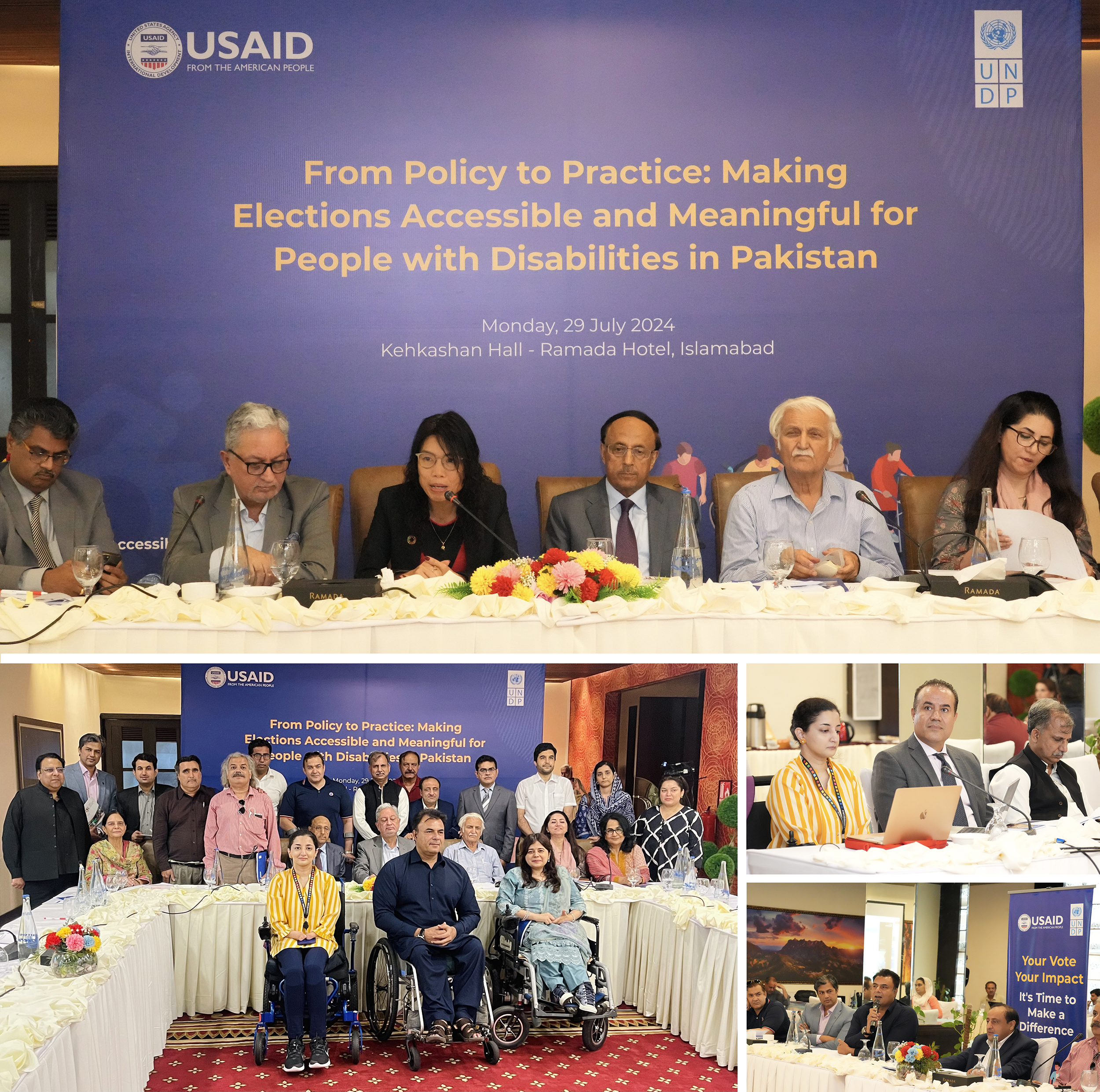
29 July 2024, Islamabad: United Nations Development Programme (UNDP) in Pakistan hosted a national consultation on “Making Elections Accessible and Meaningful for People with Disabilities in Pakistan” in Islamabad. The multi-stakeholder event made a compelling call upon the provincial and the federal government to ensure full implementation of Pakistan’s national and international legal obligations for ensuring removal of all forms of barriers faced by voters with disabilities in casting their votes. The event also urged the government stakeholders to steadfastly mainstream the Accessibility code of Pakistan 2006 in construction of all public usage infrastructure.
The consultation included PWD representatives, parliamentarians, government officials as well as representatives from national human rights institutions and civil society organizations. The National Consultation was preceded by four provincial Focus Group Discussions (FGDs) where provincial counterparts discussed accessibility to public buildings particularly schools and other buildings which were converted to polling stations on election day.
During the consultation, key challenges and recommendations were presented by the four provincial chapters of the National Commission of Human Rights (NCHR), Balochistan Commission on the Status of Women (BCSW), and UNDP Pakistan’s Strengthening Electoral and Legislative Processes (SELP) project team. These consultations led to the development of consolidated action points by representatives from the Provincial Election Commissions, Human Rights Institutions, Line Departments, NADRA, Provincial Bureaus of Statistics, and notably, representatives from PWDs. These action points will be presented at the “National Implementation framework on Enhancing the Accessibility for Persons with Disability (PWDs) in Pakistan” event scheduled to be held in Islamabad on 29 July.
The event highlighted the need for accessible public buildings and the implementation of disability legislation across Pakistan. Participants noted that despite existing legislation, the lack of implementation continues to marginalize PWDs. Discussions revealed that while Punjab, Sindh and Balochistan have disability laws, Khyber Pakhtunkhwa lacks such legislation. However, PWD representatives stressed that lack of implementation, even in regions with laws, leaves public spaces largely inaccessible. Greater political will is required to advance disability inclusion effectively. Federal government entities, including Senate and National Assembly members, acknowledged these gaps and stressed the necessity for robust actions, particularly in making public spaces, especially school buildings, accessible to improve the political and electoral participation of PWDs.
More specifically, the consultation discussed that effectively implementing relevant legislation and constitutional provisions requires shared responsibility and strong leadership. Key actions to champion equitable inclusion of PWDs in elections requires a thorough review of pre-election processes like registration of voters with disabilities, disaggregated data collection on the status of their inclusion, disability-friendly postal balloting, and ensuring accessible government and private infrastructure according to the Accessibility Code of Pakistan 2006, which is also incorporated into provincial and federal legislations on the rights of PWDs.
Most importantly, the consultation concluded with the agreement that the recommendations will need a collaborative, sustained and concerted effort through inter-ministerial, inter-services, and civil society coordination to ensure that no citizen is left behind in exercising her or his fundamental right to vote.
### ### ###
Contact Details:
For additional information, please contact Fizza Bangash at fizza.bangash@undp.org or +92 (51) 835 5631
About UNDP:
UNDP is the leading United Nations organization fighting to end the injustice of poverty, inequality, and climate change. Working with our broad network of experts and partners in 170 countries, we help nations build integrated, lasting solutions for people and the planet.
Learn more at undp.org or follow at @UNDP.

 Locations
Locations



